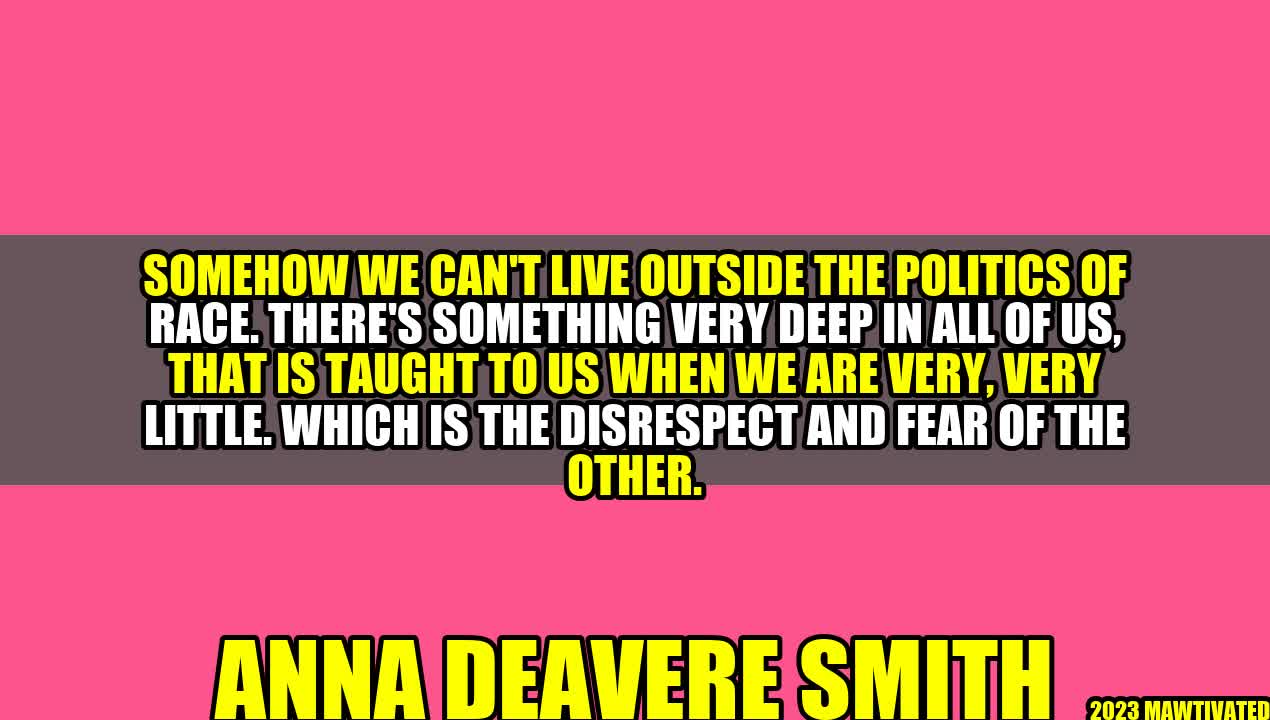Breaking the Politics of Race: Insights from Anna Deavere Smith

It was a sunny day in the suburbs when Jimena, a young Latina, walked into her new school. She was excited to start afresh and make new friends. However, she was met with a cold stare from her neighbor, who noticed her skin color within moments. The situation escalated quickly, and soon rumors were circulating about her involvement with gangs and drugs.
Jimena was devastated. However, the situation took a turn for the better when a teacher named Ms. Rodriguez stepped in. She took the time to listen to Jimena’s side of the story, and her proactive approach diffused the rumors before they could cause irreparable damage.
Jimena’s story is not unique. Racism is a pervasive issue in modern society, and it affects all of us, irrespective of our ethnic backgrounds. It’s a topic that demands attention and introspection, and nobody understands this better than Anna Deavere Smith, an American actress and playwright.
The Life of Anna Deavere Smith
Anna Deavere Smith is a prominent author, playwright, and actress, with a focus on social justice movements and race relations. She is known for pioneering a unique form of documentary theatre, where the interviewer’s words are recorded verbatim and performed onstage.
Throughout her career, Anna has always highlighted the role of race in society. In her Ted Talk, she opines that society’s disrespect and fear of the other is often taught at an early age. “It’s something that’s very deep in all of us,” she says.
The Role of Politics in Race Relations
Politics plays an integral role in shaping race relations. It often determines policies and attitudes that affect minorities in society. For example, the current political climate in the United States has led to a wave of racist and xenophobic rhetoric, which has fueled hate crimes and led to an increase in racial tensions.
However, Anna Deavere Smith highlights that politics should not dictate the way we treat people from different backgrounds. Instead, it should be used as a tool for creating awareness, understanding, and empathy in society.
Examples of Breaking the Politics of Race
Breaking the politics of race is not an easy task, but it’s not impossible. There are various examples of individuals who have managed to do so. One such example is when Daryl Davis, a renowned black blues musician, befriended members of the KKK. His approach was to listen to their views and offer his own, which helped to break down the prejudices and preconceived notions they had about African Americans.
Another example is when social justice activist Bryan Stevenson founded the Equal Justice Initiative. His work has helped to fight against racial injustice in the United States, particularly against minorities who are often marginalized in the criminal justice system.
The Three Key Takeaways
Breaking the politics of race is a long and challenging fight, but it’s necessary for a more just and equitable society. Here are three key takeaways that can help individuals on this journey:
- Listen: In order to understand the perspectives of others, it’s crucial to listen to them without judgment. This requires a willingness to learn and a commitment to setting aside preconceived notions about people from different backgrounds.
- Empathy: Empathy is the ability to understand and share the feelings of others. It’s a critical tool in breaking the politics of race, as it allows individuals to connect with people from different backgrounds on a deeper level.
- Speak Up: Silence can be damaging, especially in situations where racist or discriminatory comments are made. It’s important to speak up in these situations and challenge these attitudes. This can be done respectfully, but it’s necessary to ensure that such behaviors are not normalized in society.
Hashtags, Keywords, and Category
Hashtags: #breakingpoliticsofrace #socialjustice #racialequity
Keywords: politics, race, social justice, empathy, prejudice, discrimination
Category: Social Justice, Race Relations, Politics
In Conclusion
The politics of race is a complex issue that requires a comprehensive solution. Understanding the issue by listening, empathizing, and speaking up are just a few strategies individuals can use to break the cycle of prejudice and discrimination. By doing so, we move towards a more just and equitable society, where everyone is valued and respected, irrespective of their background.

Curated by Team Akash.Mittal.Blog
Share on Twitter
Share on LinkedIn